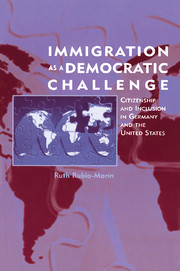Book contents
- Frontmatter
- Contents
- Acknowledgements
- 1 Introduction
- 2 A democratic challenge
- 3 Fair to whom?
- 4 Safeguarding liberal democracy from itself
- 5 Inclusion without consent
- 6 Keeping nationality relevant
- 7 The constitutional debate in the United States
- 8 The constitutional debate in Germany
- 9 Summary and final remarks
- Bibliography
- Index
- Index of Cases
8 - The constitutional debate in Germany
Published online by Cambridge University Press: 22 September 2009
- Frontmatter
- Contents
- Acknowledgements
- 1 Introduction
- 2 A democratic challenge
- 3 Fair to whom?
- 4 Safeguarding liberal democracy from itself
- 5 Inclusion without consent
- 6 Keeping nationality relevant
- 7 The constitutional debate in the United States
- 8 The constitutional debate in Germany
- 9 Summary and final remarks
- Bibliography
- Index
- Index of Cases
Summary
The German case presents both relevant differences and similarities with that of the USA. They both share the challenge that a permanent non-national population residing in the country currently poses to constitutional liberal democracies. However, as we saw, Germany's immigration tradition is much more recent. Therefore, the time-frame of the country's constitutional response that I will analyse will be more limited. This will be particularly Germany's postwar era immigration experience, an experience Germany has denied and continues to deny is integral to its national identity. We are talking about how the German Basic Law, which also dates from the postwar period, and the scholars and judges who have interpreted it have been responding to such an experience and to the changes in Germany's social composition that have accompanied it.
Aliens and the residential community: the inclusive potential of the Constitution's liberal democracy
Aliens and the German Basic Law
Unlike the US Constitution, the 1949 German Basic Law (henceforth GBL) contains a systematic demarcation between the rights reserved to Germans and the rights which apply to everyone. The universal scope of the rights is naturally seen as the rule and the restrictions on some of them as the exception (Isensee 1974: 74). In this, the GBL is a reaction against the positivist tendencies of a recent past which had led to the horrendous atrocities of the Nazi regime.
- Type
- Chapter
- Information
- Immigration as a Democratic ChallengeCitizenship and Inclusion in Germany and the United States, pp. 186 - 234Publisher: Cambridge University PressPrint publication year: 2000



